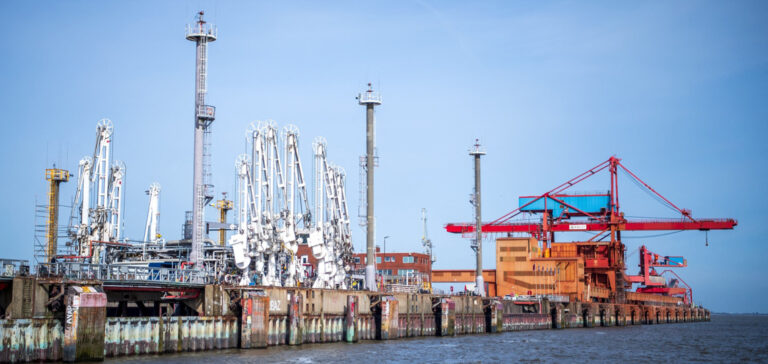As armed conflicts and geopolitical tensions continue to dominate the global agenda, European officials are turning to U.S. LNG to meet their energy security needs while seeking to meet their emissions reduction targets. Global oil and gas markets remain marked by the loss of large quantities of Russian supplies, tense market balances and volatile prices, with the war between Israel and Hamas and related tensions in the Middle East threatening further disruption.
The Role of American LNG in the European Energy Mix
Although Europe’s energy situation has improved considerably since the early days of Russia’s invasion of Ukraine, the region’s short- and medium-term future remains characterized by great uncertainty, European officials said at events in Washington.
Transatlantic Cooperation and Energy Security
“Europe’s import needs are likely to remain high for many years, as gas production in Europe is expected to decline further,” said Norway’s Minister of Oil and Energy, Terje Aasland, on October 31 at an event organized by the Center for Strategic and International Studies. “Together with Norwegian gas, US LNG has proven to be a reliable and stable source of supply for Europe and will contribute to the security of its energy supply,” added Aasland.
The Oil & Gas Industry’s Contribution to Climate Objectives
Ditte Juul-Jorgensen, Director General for Energy at the European Commission, commented in an informal discussion with the Atlantic Council on October 30 that “transatlantic cooperation has been absolutely crucial for our energy security and for global stability, in general.” Both reacted to criticism that continued investment in oil and gas would hamper the fight against rising global temperatures, in contradiction with the Paris climate agreement and the EU’s goal of being climate neutral by 2050.
The Challenges of Meeting Energy Demand and Reducing Emissions
“A fairly coherent picture is emerging: by 2050, there will be very little fossil energy in the system… but between now and 2050, we’re going to continue to need molecules in the system,” Juul-Jorgensen asserted. “Once we’re past 2050, the question will be whether we can remove carbon from any remaining fossil fuels in the system. I’m not going to speculate on that. What’s very clear is that we’re going to need to import energy over the next few decades.”
The Oil & Gas Industry’s Contribution to Climate Objectives
As far as the relationship between the USA and the EU is concerned, US LNG exports have helped to maintain energy supplies as Europe moves away from Russian pipeline gas. “What we’ve done on the import side is to make sure that the infrastructure we have is aligned with this new vision,” said Juul-Jorgensen. “This means that we have invested significantly in LNG import facilities and made some limited investments in infrastructure so that gas can no longer flow from east to west, but we can secure energy supplies throughout the EU.” She added that she hopes to see the US make “the necessary investments in export capacity” to meet demand needs and ensure a stable global LNG market for decades to come.
The Oil & Gas Industry’s Contribution to Climate Objectives
Juul-Jorgensen seemed to downplay concerns that US policy and aggressive environmental pressure could jeopardize continued exports of US LNG to Europe, especially as another “winter of crisis” approaches. She highlighted the success of the US-European Energy Security Task Force in addressing gas supply challenges through coordination and a joint response.
The Oil & Gas Industry’s Contribution to Climate Objectives
“Power, capital and competence”. Norway’s Terje Aasland asserted that the oil and gas industry was destined to play a key role in achieving global climate ambitions. While oil companies
and gas companies are raking in record profits thanks to fuel price hikes triggered by geopolitical tensions, Aasland said the industry had a duty to “transfer revenues into new technologies, take more risks… reduce emissions and bring new solutions to the table.” He praised the companies that have taken steps in this direction.
The Oil & Gas Industry’s Contribution to Climate Objectives
“I’ve told the oil and gas industry in Norway many times that every problem in Norway’s 50-year oil and gas history… has been solved…. [avec] a business-led solution,” he said, adding that the industry had the power, capital and competence not only to support the development of renewables, but also to “find new decarbonized solutions for the use of oil and gas.” Aasland argued that adequately meeting energy demand and mitigating climate change would ultimately depend on three challenges: energy security, emissions reduction and energy affordability.
Strong energy security must be maintained through investment in greater generation capacity; emissions from fossil fuel use must be reduced, while more renewable energy is brought into the system; and energy prices must remain affordable to ensure consumer buy-in to the energy transition, he asserted.
The Aasland Declaration
For his part, Aasland declared that Norway was stepping up oil, gas and offshore wind development on the Norwegian continental shelf. For example, the region is home to the world’s largest floating wind farm, Equinor’s Hywind Tampern, which supplies nearby oil and gas platforms, reducing the carbon intensity of production. Aasland noted that Norway imposes a high tax on carbon emissions from the oil and gas sector, which has prompted the industry to look for ways to electrify production and take other measures to reduce its carbon footprint.
In a world marked by geopolitical tensions and uncertainties, European officials are turning to American LNG as a reliable source of energy supply. The partnership between Europe and the United States in the LNG sector is seen as crucial to ensuring energy security and meeting climate objectives. As the energy landscape evolves, investment in infrastructure and technology will play a crucial role in shaping the future of energy security and sustainability.





















